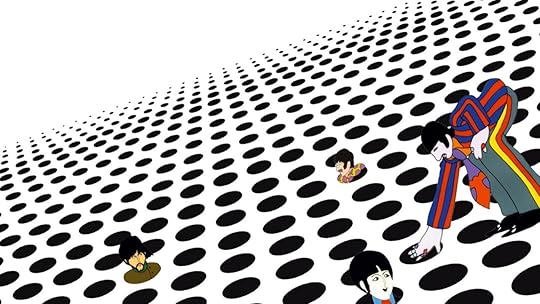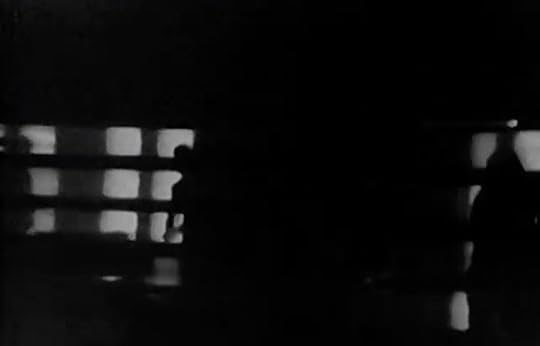Nicholas Carr's Blog, page 2
April 10, 2025
Epistemological Slop
 Still from the 1968 film Yellow Submarine
Still from the 1968 film Yellow Submarine“I said, Who put all those things in your head?” —Lennon/McCartney, “She Said She Said”
For a while now, I’ve been meaning to write something about the corruption of the Google search engine, which strikes me as one of the defining stories of the information age. This is not that story. But it’s related. As I was writing my last post about television and thinking about the various cultural responses to TV in the sixties and seventies, I started wondering w...
April 6, 2025
I Remember How the Darkness Doubled
 Lou Reed in performance, 1976
Lou Reed in performance, 1976Tell a Vision
So Lou Reed walks into a bar — CBGB’s — and he’s carrying a cassette recorder. It’s the summer of 1976, and the hip but as yet unsigned band Television is the night’s headliner. Tom Verlaine, the group’s chief guitarist, songwriter, and singer, spots Reed with the recorder and assumes he’s come to tape the band so he can copy its distinctive, wiry sound. He confronts the Rock ‘n’ Roll Animal. In an interview published a few months later in Screw, Al Gold...
March 10, 2025
Strong Men and Strong Machines
 Norbert Wiener with his cybernetic insect “Palomilla.”
Norbert Wiener with his cybernetic insect “Palomilla.”
“The machines will do what we ask them to do and not what we ought to ask them to do.”
—Norbert Wiener
1.
In his 1950 book The Human Use of Human Beings, Norbert Wiener, the pioneering information theorist, tells the story of an early misreading of scientific evidence. After the invention of the microscope at the start of the seventeenth century, natural philosophers rushed to examine all kinds of substances with the new device. But one obvious...
March 2, 2025
On Autopilot
Nowhere have the effects of computer automation been studied so deeply as in the field of aviation, where the consequences of even small errors can be dire. In today’s Sunday Rerun, drawn from my 2014 book on automation, The Glass Cage , I look at what’s been learned from the research. Inside today’s computerized cockpits we find important lessons about how automation shapes our jobs, talents, and lives — and a possible warning about AI.
 Wiley Post and his plane Winnie Mae, circa 1933.
Wiley Post and his plane Winnie Mae, circa 1933.The lives of...
February 25, 2025
Contemplation as Rebellion
This is the third installment of my series Seeing Things. In the first installment, also titled “Seeing Things,” I discussed how the contemplative gaze can be both aesthetic and interpretive. In the second installment, “Restoration of the Demon,” I looked at the contemporary phenomenon of re-enchantment. Here, I weave the threads together.
 Winslow Homer, Artists Sketching in the White Mountains
Winslow Homer, Artists Sketching in the White MountainsThe middle section of Seamus Heaney’s triptych “Seeing Things,” the title poem of his 1991 collection, ...
February 11, 2025
AI and the Missing Mother
 The Star Child. Still from 2001: A Space Odyssey.
The Star Child. Still from 2001: A Space Odyssey.There are a few quotations that come up frequently in my work. One is from the twentieth-century German philosopher Günther Anders:
Human beings are ashamed to have been born instead of made.
It expresses Anders’s idea of Promethean shame: modern humans’ sense that their fleshy, mortal, meatspace selves are inferior to the beautifully designed and constructed machines they build. Machines are predictable and efficient; they operate in a rational man...
February 9, 2025
In the Kingdom of the Bored, the One-Armed Bandit Is King
Today’s edition of Sunday Reruns takes us back avant le déluge, to 2015. Music streaming hasn’t yet taken over completely. Everyone still has an iPod or two lying around. Hard drives and flash drives bulge with MP3s. This post, from that year, is something of a nostalgia trip. But in its exploration of listening habits and app fetishes, I like to think it retains some currency. So sit back, hit Shuffle on that iTunes playlist you spent so much time curating, and read on.
 Automatic for the People...
Automatic for the People...
February 5, 2025
Restoration of the Demon
 Joshua Reynolds, The Death of Cardinal Beaufort. Note the demon.
Joshua Reynolds, The Death of Cardinal Beaufort. Note the demon.This is the second installment in my occasional series “Seeing Things,” where I explore contemporary modes of human perception. The first installment considered the relationship between the aesthetic and the interpretive view. This one takes up the question of enchantment.
The land may vary more;
But wherever the truth may be—
The water comes ashore,
And the people look at the sea.
—Robert Frost
Contemporary man’s faith in reality, in an...
January 31, 2025
I Shot My TV Just to Watch It Die
 Still from Nicolas Roeg’s The Man Who Fell to Earth.
Still from Nicolas Roeg’s The Man Who Fell to Earth.The Harvard Gazette is running an excerpt from the start of the concluding chapter of Superbloom, in which I discuss media’s Nietzschean ability to absorb threats by turning them into content. The excerpt opens with the cautionary tale of Frank Walsh, the first man to shoot a television set.
It was a Sunday night, October 19, 1952, and Frank Walsh, a Long Island electrician who moonlighted as a security guard, was worn out. He headed upstairs to...
January 27, 2025
The Mechanization of Meaning

One of the themes of Superbloom, my new book, is the recent, dramatic, and largely unheralded expansion of the role of machinery in media. If you think of media as a system for the distribution of speech, you can break it down into three basic roles or functions:
Message creation (the speech function)
Message selection (the editorial function)
Message transmission (the transport function)
From media’s origins in the ancient world up until the early morning hours of September 5, 2006, the way these f...



